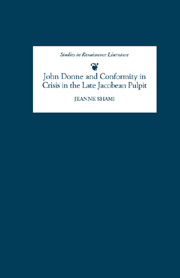Book contents
- Frontmatter
- Contents
- Dedication
- Acknowledgements
- Abbreviations
- 1 “Discreet or religious preachers”: John Donne and the late Jacobean Public Sphere
- 2 “The indiscretion of that foole”: John Knight and the Jacobean Pulpit, 1620–2
- 3 “The fishing of whales”: John Donne's Sermons, 1620–2
- 4 “Faire interpretation”: The Directions and the Crisis of Censorship
- 5 “Wise as Serpents, and innocent as Doves”: Zeal and Discretion in the Pulpit, 1623–5
- 6 “Jesus Wept”: The Journey to Spain and Pulpit Lamentation
- 7 “Blinde buzzards in the choise of a wife”: Sermons and the Moral Marketplace
- 8 “The Lovesick Spouse”: Parliament, Patriots, and the Public Sphere
- 9 “Church-quakes”: Post-Parliamentary Faultlines
- 10 “If the Foundations be Destroyed”: Rules of Engagement
- 11 “Blessed sobriety”: John Donne, the Public Sphere, and Caroline Conformity
- Works Cited
- General Index
- Index to John Donne References
- Index to John Donne's Sermons
- Studies in Renaissance Literature
6 - “Jesus Wept”: The Journey to Spain and Pulpit Lamentation
Published online by Cambridge University Press: 12 September 2012
- Frontmatter
- Contents
- Dedication
- Acknowledgements
- Abbreviations
- 1 “Discreet or religious preachers”: John Donne and the late Jacobean Public Sphere
- 2 “The indiscretion of that foole”: John Knight and the Jacobean Pulpit, 1620–2
- 3 “The fishing of whales”: John Donne's Sermons, 1620–2
- 4 “Faire interpretation”: The Directions and the Crisis of Censorship
- 5 “Wise as Serpents, and innocent as Doves”: Zeal and Discretion in the Pulpit, 1623–5
- 6 “Jesus Wept”: The Journey to Spain and Pulpit Lamentation
- 7 “Blinde buzzards in the choise of a wife”: Sermons and the Moral Marketplace
- 8 “The Lovesick Spouse”: Parliament, Patriots, and the Public Sphere
- 9 “Church-quakes”: Post-Parliamentary Faultlines
- 10 “If the Foundations be Destroyed”: Rules of Engagement
- 11 “Blessed sobriety”: John Donne, the Public Sphere, and Caroline Conformity
- Works Cited
- General Index
- Index to John Donne References
- Index to John Donne's Sermons
- Studies in Renaissance Literature
Summary
THE FIRST half of 1623 was dominated by one event: the departure of Prince Charles and Buckingham for Spain in February – in disguise – and the prolonged negotiations for a match with the Spanish Infanta. Every other matter – both domestic and foreign – paled in comparison to interest in this event and its real and imagined repercussions. Even concern for Elizabeth and her family on the continent was enmeshed in the details of this proposed alliance, Charles having promised his sister that he would not marry with Spain without restoring Frederick's hereditary lands in the Palatinate (in retrospect, a hopeless promise). Fears for the prince's personal safety and honour in Madrid, and for his spiritual constancy in the heart of Catholic Spain, promoted rumours of his conversion to Catholicism, rumours fanned by reported concessions to English Catholics in negotiations with the Infanta's brother, Philip of Spain. Some toleration of popery and further relaxation of the penal laws against recusants were only two of the unpalatable consequences of this journey.
The Directions warned preachers against meddling with these and other matters of state, but conditions of censorship reached a critical stage following the prince's departure for Spain in early February, as James took pre-emptive measures to prevent public commentary on the event. The secretive way in which this journey was executed suited James's ends better than a foreign policy initiative undertaken after broad public consultation. This was one event that James did not want brought into the public sphere.
- Type
- Chapter
- Information
- John Donne and Conformity in Crisis in the Late Jacobean Pulpit , pp. 166 - 182Publisher: Boydell & BrewerPrint publication year: 2003



